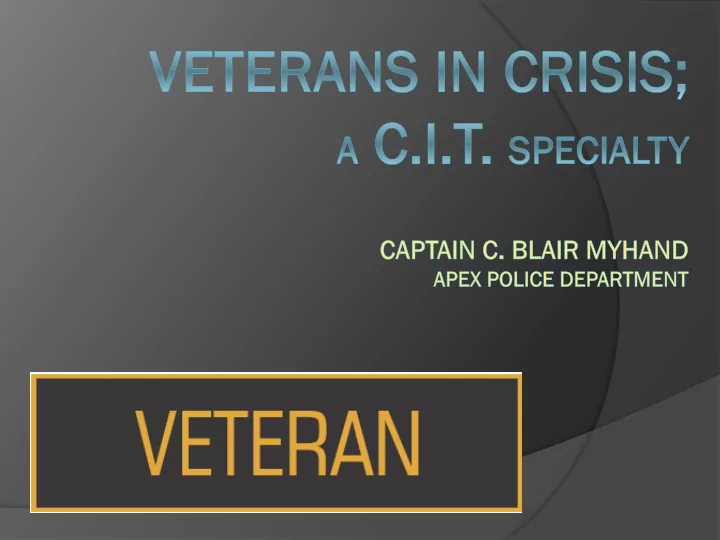

History: What we know already Veteran issues are real; Encounters between veterans in crisis and law enforcement can be dangerous and potentially deadly; People empathize, but few actually recognize the difficulties many veterans experience from military service; We know more can be done to mitigate the dangers and help veterans connect with available resources.
Concept Shared consciousness is an important aspect of this training; Veteran connections span racial, cultural, ethnic, and gender gaps; A heavy emphasis is placed on connecting with the veteran and coordinating available resources; Officers learn to “bridge the gap,” develop rapport, and apply CIT skills utilizing veteran specific resources.
What was initially proposed: A post CIT specialty class for all interested combat veteran law enforcement officers. The class would consist of 16 hours of additional CIT training with on-site visit to a veteran crisis center or VA hospital. The creation of a pool of qualified officers to assist agencies who do not have this resource within their own ranks. Close coordination and buy-in from agency leaders to support this mission is critical.
As things progressed, things changed: The “combat” was dropped from the title; Mental health experts were tasked with specific blocks of instruction; The “site visit” changed to a “resource fair”; All volunteers and role players were veterans; Major support was garnered from the North Carolina Chapter of the American Legion.
Wake County Veterans CIT Training Class #1 September 23-24, 2015 Wednesday Thursday 9/23/2015 9/24/2015 Welcome, Icebreaker, Introductions Resource Fair 8:00a-8:45a 8:00a-10:00a Captain Blair Myhand Participants: WellPath Acupuncture, Durham Roosevelt Richard VA Hospital, NC4Vets, American Legion, Stop Soldier Suicide, and Healing Transitions Substance Abuse Anti-Stigma Rethink Campaign 9:00a-9:45a 10:00a-10:45a Ed Fairfax, Healing Transitions Terri Kachur Alliance Behavioral Health Trauma Part II Veterans Justice Outreach 10:00a-12:00p 11:00a-12:00p Ann Oshel Jeremy Brogden Alliance Behavioral Health Durham VA Veterans Homelessness Role Plays 1:00p-1:45p 1:00p-3:00p Passage Homes Veterans Suicidality Wrap Session 2:00p-2:45p 3:15p-4:00p Dr. Juleanne Erickson All Students Raleigh Police Department Survivors Guilt Graduation 3:00p-3:45p 4:00p-5:00p Dr. Gregory Inman Raleigh Vet Center Crisis Hotline: Veterans Press 1 4:00p-4:45p HBO Video Presentation
Class Statistics Twenty-two (22) veterans were trained over two days; Six (6) county agencies participated; Students are now ambassadors within their own agencies; Media was present and interviewed participants and volunteers.
Lessons Learned: Sustain Role player preparation is critical; Using veterans as role players added value; Using veterans to speak about their own experience with law enforcement, before and after a crisis, drove home the importance of the training; Having the Resource Fair on site saved time and added value to the training.
Lesson Learned: Improve Not all classes worked as planned (changes are being made) ; Instructors must have veteran specific experience and must know their audience; Ensure all training and/or resources are veteran specific; Increase time of training class by adding a four (4) hour site visit post graduation.
Going Forward Adjustments are being made based on student evaluations; A steering committee is being created to maintain course standards and student selection criteria; A second class is being offered in February 2016 (future classes are TBD) ; A train-the-trainer course will be developed to assist other agencies.
Comments / Feedback
Recommend
More recommend